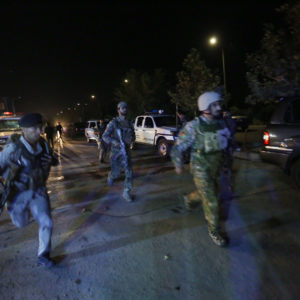These days, it is too easy to get overwhelmed by the news coming out of Washington. Fights over health care, immigration and the environment dominate the airwaves. So I am here now in order to help navigate all this news by highlighting a crucial piece of legislation recently introduced to Congress by Sens. Jeanne Shaheen, D-New Hampshire, John McCain, R-Arizona, Jack Reed, D-Rhode Island, and Thom Tillis, R-North Carolina.
On March 15, these senators proposed the “Keeping Our Promise to Our Afghan Allies Act,” a bill that will make 2,500 additional visas available to Afghan interpreters through the Special Immigrant Visa (SIV) program. Since 2009, the SIV program has authorized the State Department to issue visas to both Iraqi and Afghan interpreters who served alongside U.S. forces in combat. As a result, thousands of lives have been saved considering the fact that interpreters and their families, due to their heroic work for U.S. troops, often are marked for death by the very extremist organizations they helped us hunt down and bring to justice.
One would be hard-pressed to find someone in the military who served with interpreters overseas and yet believes those selfless individuals have not earned the right to call themselves American and enjoy the safety of our soil that they helped defend by aiding Americans abroad. And even when these interpreters do strive to come to the United States, the road is long, dangerous and fraught with difficulty: intensive interviews, comprehensive background checks, fingerprint screenings, and even biometric data analysis are just parts of what make up the rigorous vetting process
The good news among all this is that the SIV program has been and continues to be a bipartisan effort. The bad news, however, is that one bad actor can stop this legislation in its tracks.
The truth is that this should not require renewed legislation every few years; it should be baked into our military strategy, for the protection of the local men and women who sacrifice greatly in our name is the best way to ensure any future aid from their communities. The process for them to enter the United States requires extensive vetting, as it should, but waiting on Congress to act should not be an impediment to the freedom and safety of these selfless individuals and their families.
Now, there may be some among us who cannot differentiate between translators who served and fought alongside American troops and extremists who wish to do us harm, but we must recognize that every responsible lawmaker has access to real information. They know that protecting those who have helped our service members — in many instances, saving their lives — is critical to American credibility and national security. We mustn’t let fear or prejudice undermine our commitments: It is as wrong as it is weak.
Let me be clear, the SIV program should sit at or near the top of each senator and representative’s to-do list. It represents the very idea of America. And this is not a game; many of these folks have been killed while waiting on their visas. This is why it’s so important that we take swift action and authorize more visas for the Afghan interpreters who so willingly risked their lives for us.
Such an action would stand as the first step toward an immigration policy that presents an alternative to the ineffective, xenophobic and downright racist moves of the Trump administration.

